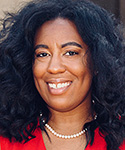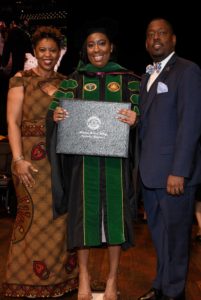June 3rd, 2020
Will the Real Doctor Please Stand Up?
Allison Latimore, MD

Dr. Latimore is the Education Chief Resident at the MedStar Washington Hospital Family Residency Program in Washington, DC
I stood in the hospital elevator yawning and rubbing my eyes, waiting to get off on my floor. A woman looked over at me and said, “Congratulations.” I began to look over my body. Did I look pregnant in these scrubs? Did I have on my real engagement ring instead of my silicone ring? After a few seconds of wondering why she could possibly want to congratulate me, I asked, “On what?” She looked at my physician badge and said, “Your job.” I was stunned. Here I am. Frustrated with working long hours. Unable to realize my position of privilege in that moment. There have been moments in residency that I’ve had people of color tell me how proud of me they are. I’ve had little girls tell me that they want to be like me when they grow up. But the reality is, I struggle to believe that I even belong in this career.
You Are the Doctor?
I am a short black woman, in her 20s. When I walk into an exam room with a white coat on, so many patients tell their relatives on the phone, “Hold on. The nurse is here.” My personal favorite is being called a baby doctor, because at least I still look young. I’ve stood on a hospital floor reading an EKG with a stethoscope around my neck, and have been asked, “Are you the secretary?” The person who asked was the night secretary reporting for her shift.
It’s hard for me to go along with some of the simplest things in medicine. For example, some of my colleagues don’t wear white coats for a myriad of good reasons. When I’m in the hospital, I feel it is necessary to wear a white coat, because a badge that says, “Physician” or “MD” is not enough to remind people that I am indeed a doctor. There are people who feel that referring to yourself as Dr. to others in the medical field or to patients is pompous or reserved for attendings, but I feel I need to, just so people understand my role in their care. I’ve had a patient ask me if I was legally a doctor before just observing an in-office procedure. There have been times when I’ve been disrespected by colleagues or others in the medical field, and I can’t help but wonder why they felt it was okay to speak to me in that way. Is it because I’m young, black, a woman, all of the above, or am I being overly sensitive because of the aforementioned reasons?
Pay it Forward
For every uncomfortable situation, there have been positives. I have had the opportunity to mentor at my alma mater and to share my story, my setbacks, and my successes with students to encourage them to pursue this career.
As of March 2019, ≈300,000 out of the ≈1 million doctors in the U.S. are women. I feel that it is imperative to tell the truth about this path, because I didn’t come from a lineage of physicians. I was a 5-year-old with a dream to become a doctor, whose parents never stopped believing in her when she stumbled. I was fortunate to make connections with people who helped me figure out my path, and I feel a responsibility to do the same for others. Even with 3 degrees, a closet with multiple white coats, and a stack of ID badges for different hospitals and offices, I sometimes still don’t feel like I should be here. Some days, I don’t feel qualified to be writing this blog. But for whatever reason, I am here. So how do I get over the feeling? I know that anyone can feel like an imposter in this profession. If you did, how did you get over it? Does it just take time? I’m still looking for answers!






Maintain your childhood dreams – any others – world peace, end of differences and start of diversity?
I relate with what you’re saying, especially as a black man. I think time & comfort in yourself as a doctor play into it. I went to a practice where everyone in the office referred to themselves by first name, including the orthodontist. Granted he’s much older than me and Caucasian, but still.
I initially introduced myself as Dr. S, & the orthodontist supported me in doing it bc I put a lot of work in to earn that title. But as I saw how they operated, & how the patients respected and loved them the same, I realized it was more of my pride holding on to the title. Like that “Doctor” & white coat made me the expert & exempted me from being challenged by my patients.
But I had been challenged and disrespected by patients regardless of whether I introduced myself as “Dr. S” or had a white coat on lol. So I decided to drop it to try it out. What I realized is that people will respect & listen to you if they feel valued and respected first. Checking your ego at the door, and staying humble, patient, and kind are the key.
Currently I still prefer introducing myself as “Dr. S,” but that’s more for myself than others. But I’d say do whatever makes you most comfortable in your surroundings. As long as you know you’re not impersonating your profession, what others think doesn’t matter. I look forward to those moments when I can inform someone that I’m their doctor, and change their perception of what they think a doctor is.
I’m sorry you feel this way and can relate to some aspects. As a female physician, I have also been looked at with skepticism and hurled disrespectful comments from those in the profession, other professions and patients. I do not mean to undermine the reasons you feel like this when you ask if it’s because you are “young, black, a woman or all the above”. However, having practiced in both the UK and US, the problem seems to be systemic among female physicians…young, old, of varying colors and those who are sensitive vs thicker skinned. I’ve worked with an array of intelligent young female doctors, of all ethnicities and each has relayed these feelings. I’ve worked with older female physicians that again, have the same thoughts…some of them with skin as thick as leather…or so it appears. I’ve come to the conclusion that in a way, we are carrying these burdens collectively, almost volunteering to be stripped of confidence and boldness and agreeing to live in suppression in order to maintain professionalism and peace with others. Without knowing the intricacies of you, I see you have earned three degrees… telling me that you’re well versed in what it means to work hard. You, under no circumstances ought to feel as though you’re not qualified. Even without numerous degrees to one’s name, anything less than respect is unacceptable. I believe that is a thought that has been planted by others and that many of us have accepted as true. The mindset of others need to change In regards to female physicians, this is a fact. But our mindset, as female physicians also needs to change. We’ve worked hard, we must stand in boldness and confidence. I sincerely hope for the best for you.
Friend!!! Thank you for talking about this!! I experience the same experiences nearly everyday. I don’t have the answers either, but I’m glad we have each other and our own circles of support to lift us up and let us know that we DO belong, we DESERVE to be here, and we’re needed now more than ever.
It does take time. I even think the proverbial “white male” feels like an impostor at times in the early years. There weren’t many female docs back in my day (I’m 65), and I certainly could have been insulted on many occasions. But I knew the landscape was changing and I reasoned that if I was generous to people, I would be able to help teach them that I was now an option. And If I didn’t suit their needs, they could choose another doctor next time. Many found me acceptable, and my practice in Family Medicine grew and gave me patients and lifelong friends. It seemed plausible to me that an older man might find it odd to be examined by someone who looked like their daughter. The unfamiliar is hard for all of us. But I saw their wives, and often the husbands gravitated over to me for some visits. My husband was in the practice with me and the men were often more comfortable there for a while.
It will come. I would recommend being generous to the curious and generous to yourself. You are a teacher too.
Oh Dr. Latimore-
Get ready for the long-haul. You are a doctor. It is not just reserved for attendings and anyone who tells you so is not qualified to make that comment. Pompous? No, it’s other people’s lack of understanding of what a resident physician is. It will get better over time but I don’t know that I will ever disappear how are you are perceived and treated. I finished my residency in 1994, my fellowship in 1998, and people still ask me to get there love one a blanket or to get their nurse for them, etc. The professional coat and name tag are helpful, but somehow, people are looking at you from the neck up. They see a female. I would like to believe that you are at least never mistaken for housekeeping. I am a pulmonary and critical care physician and never wear scrubs to work and for that matter, a lab coat (it’s a fomite), and only dress in casual business attire. Right out of fellowship working in the city of Chicago, my partners all wore suits and so did I. The bottom line, your skin will get thicker over time (it needs to) and you’ll have a mental file of answers to questions that should not be directed to you that will come off as polite to the person who asked it (“I’m sorry, you’ll need to ask one of the nurses for that”). Does it not bother me at all? No. Were these questions being asked of my male colleagues (Or sometimes even a non-physician male who is sitting near me)? No.
Namaste
Your comments brought back many incidents my daughter would tell me about during her 25 year medical vocation.
She was an ER Physician and Residency Program Director. Highly thought of by her colleagues but the patients were often the ones who would, after the examination and discussion of their ailments, would ask her “when will I be seeing the doctor!”. She would laugh. It was always the fact that she was a woman. All prejudices are deeply ingrained and will rarely change. That burden is carried by them so we must be grateful it is not ours too. I know my daughter would want you to know every woman doctor experiences such things and, as women, are well equipped to do so!
With every good wish for your continued success.
Thank you, thank you. Your experience is real and important. Thank you for sharing this. I hope you inspire women and girls, especially those of color, everywhere your journey takes you. Sad that this is still an issue, but it is one you may feel daily. Imposter feelings are common – use them to remain vigilant and humble, but you are strong, you are smart and you belong.
Find good mentors who will encourage and validate your struggle. Medicine is a struggle – always more to learn, always more patients to learn from. Surround yourself with those who build each other up and are working for a better future. Let it be a joy and labor of love, every day that you can.
I remember one night on CCU call. I was a woman physician, a senior third year resident, on call with a wonderful, younger, male and bearded intern. By 7am it was almost a joke between us because so many of our patients had addressed their answers to him, even when I had asked the initial question. He was more uncomfortable with this than I was, and tried to deflect by saying things like, “she’s the boss.”
My husband, also a physician, had many experiences like this in medical school and residency. Patients addressing themselves to him instead of his senior female residents.
As a new attending, I would also always wear a white coat and never invite patients to address me casually, feeling like I needed all the gravitas I could manage. Like many new attendings, it took time to adjust to making the final decisions. I would still consult senior mentors in the office about my treatment plan sometimes. And you know what? Only rarely would they have thought of something I didn’t. I began to realize I was actually good at my job. This will happen for you, too. Patients will tell you how much they trust you and your advice. You will still have moments of doubt, everyone does. But your CONFIDENCE will come when you realize your own COMPETENCE. Good luck to you. And Congratulations.
Take heart Dr. Latimore. I am also a short, black, young doctor. I think people’s response to me as a doctor has less to do with my youth and more to do with their expectations. I’m extremely familiar with your experiences and unfortunately it doesn’t get much better. I’ve been practicing for 11 years and patients still ask if I am the nurse or what year I graduated. I laugh to myself when those very patients ask for me by name on later visits. It seems the ‘little doctor’ impresses them with her knowledge and bedside manner.
Please remember you have earned the right to be where you are. Do not allow the expectations of others make you doubt your right to provide excellent healthcare. Your patients need you; the confident, qualified, petite, black you. Be yourself and continue to save lives.
You spelled out your own problem. You don’t fully believe you belong where you are. Once you feel confident in your self you will project that to others. It’s not because you’re a woman, or because you are black or because you are young. You are not a victim and shouldn’t keep interpreting others reactions to you as personal judgements. Stop expecting people to treat you with disrespect. Because that will be all you will ever see or hear.
I often go into doctors offices and will be surprised to see young doctors. This is because I’m aging. I’m adjusting to my place in this world at this stage in my life. It has nothing to do with the young doctor, it’s something with in me. So if some people say things that seem odd to you. Laugh about it. Be proud of yourself.
The victim mentality in this country is a problem. Embrace your youth, your race, your womanhood, be thankful for your intellect and the incredible opportunities you have had. Be thankful for the support you have had. Be happy with you and things will look a whole lot better all around. You sound like you have worked hard and been incredibly blessed.
Good for you!!
I am a 69 year old family doctor. Until I stopped dying my hair, and let the gray show, I think I did not have credibility. I stopped wearing a white coat when I opened my own practice at age 55. Before that I was an academic physician at a medical school and was often mistaken for a nurse if I was in scrubs or did not have a white coat on.
No matter how many women physicians, you will be mistaken for someone else unless you introduce yourself as DR…., correct misperceptions, and push your agenda. The world is not ready for soft spoken women who are not assertive. So even if you don’t want to wear that coat with pride, or be ready to correct those who think you are anyone else but the doctor.
You belong in the profession, just like all the other doctors around you. Believe in yourself, and let those misperceptions fly over DR Lattimore
feel free to email me ncdocmom@gmail.com
Dear Dr Latimore
i want to write about my wife rather than me. She was born in the ukraine and being jewish it was next to impossible for her to enroll in medical school, and i dont mean financially , it was a communist regime after all ) . After medical school and residency in cardiology ( when many patient asked to be teated by a non jew ) , she emigrated to israel . She began new residency trainnig in internal medicine and bow was disrespected both because she was a woman ( “nurse, why are you giving this young doctor orders” ) ,and because she was “russian ” . even when she finished residency and wanted to go into hematolgy there was some hesitation about offering her the position .
Despite all obstacles , being used to discrimination from childhood , she took it all with humor , correcting everyone with a smile and a joke and ignoring anyone who was not amenable to persuation
The result : until her retirement a year ago she was the most saught after hemato oncologist in the tel aviv medical center and drew in a large number of patients from the former ussr all of whom begged to be treated by a : **** jew ”
take it all in stride , see the funny side ,and your time will come .
Hi
Yes i know about academic colleauges in a hospital
I think seriously height helps in every job (but I do not wear heels that are bad like foot binding for one’s feet)
Even in SA I am not aware of Black drs being treated more badly than others by colleagues , but then I am not Black. And I do know women have a hard time
Medicine is said to no longer be for the scholarly or quiet or sensitive.
I have read a book by Elaine Aarons on The Highly Sensitive Person (15% of people) that is helpful if that its you . Sensitive people are badly needed in medicine.
I think i was still called nurse when I was a consultant. The most exciting was being asked what was wrong with me that I was not married. I think it was that there was no ring and it was meant as a compliment. One can only hope. I thought of answering – because under these clothes I have a scaly skin like a fish.
Dear Dr Latimer,
Thank you for highlighting your position. I’m a male doctor of colour have been in profession long enough to accumulate some grey hairs here and there. So I dont get these comments but when I was slightly younger I used to be asked whether I’m just a medical student or a fully fledged doctor even when I might be taking classes for medical students. My female colleagues have been referred to as nurses. And once my black consultant who I respect greatly was referred to as a ‘Nurse’ as well. I suspect your age, sex and race all factor into this.Some white patients even while they are well meaning will make a remark which can be racist. But as far as the NHS in the UK is concerned there are more female doctors than male doctors. The change is coming, slowly but surely. But you dont give up. I support you.
Hi Dr. Allison,
I have been in practice now for over 30 years and I can tell you that all those reasons are true. People do not realize their subconscious attitudes most of the time. Even when wearing my white coat, which I feel is appropriate as it defines my role and helps me fulfill it better, and even after I have introduced myself as Doctor Smith, I have had patients who called me by my first name. I have realized that is a reflection of their own insecurity with my education and experience, and also that when they trust me they begin to call me Doctor of their own accord.
In the current health care environment, it has become the modus operandi for the “team” to call each other by first names no matter what their level of training. This in my opinion is an error, but what I have found is that as colleagues in other professions begin to respect my skills and experience they begin to call me Doctor of their own accord. Even in a team environment when I am speaking of other physician colleagues I call them doctor. We have worked and studied hard for the title, and bear the brunt of the responsibility. That needs to be acknowleged by those we serve and those with whom we work. Besides which, it reminds us of our role and calling!
Keep healing,
Susan Jane Smith, MD
Dear Dr. Latimore,
When I read your text it was like reading my own autobiography. Except that I willingly chose not to become a physician I was more interested in science and wanted to explore the human body without having to deal with patients.
My father is a retired coalmine worker and I grew up in a coalmine workers neighbourhood. In the evening you could hear mothers calling for their children in Italian, Portugese, Spanish, Turkish and Dutch. I felt responsable for all of ‘us’ so I did not stop after my first university degree. I got an extra three and also did a PhD. And all this to ‘gain’ some respect. Every day I feel the same as you, as if I’m not qualified enough. Until I went for a job interview and the project leader told me he was shocked that I was so young?!? He told me he ‘google’ ed me and saw my experience and expected a middle aged lady of 45-50. I blushed and waved the compliment away because it made me uncomfortable. Many kids from my neighbourhood look up to me but I share the same insecureties and I never felt like someone to look up to. Even the idea makes me feel unfomfortable but we shouldn’t because we both know unconsiously that we had to work just that little bit harder to get here.
Please enjoy your title and embrace your power. And dump all the rest in the ‘ignor’ bin.
Thank you for writing so well to express what women physicians of minority ethnic status go through frequently. As a physician myself, I too feel the need to wear the white coat and have a badge clearly designating “MD” because too often patients and others assume that I am a nurse while a white man wearing simple scrubs would be assumed to be the doctor in the room.
I am a 62 year old white internal medicine doc. as a resident I was always assumed to be the nurse. that definitely gets better with age. I tried not to take offense; most of the females in a hospital are nurses or ancillary staff, not doctors (just numbers, there are less docs than other staff!) so people are just playing the odds when they don’t know who you are; generally they don’t mean to put you down. it will get better when you are out of training.
the imposter syndrome (I am not good enough to be here) is common among women; when I talk to my colleagues several of us still struggle with it. When that feeling raises its ugly head I try to remind myself that this is a common feeling. look up article in The NY Times about how to fight the imposter syndrome. hang in there!
Thank you all for these wonderful comments!!!!! I feel so encouraged and so inspired to have colleagues such as yourselves!